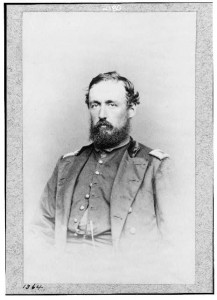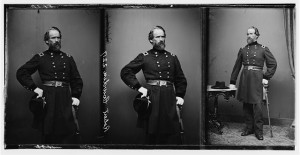More Union Troops in Gray
On May 3, 1861 President Lincoln called for 42,000 extra army volunteers for a three year enlistment. (On April 15th the president had requested 75,000 army volunteers for a three month term of service.) 150 years ago today one of the first three year regiments docked in Jersey City on its way to “the seat of war”. The 1st Massachusetts had to persevere through some challenges before it left Boston harbor. From The New-York Times:
ARRIVAL OF THE FIRST REGIMENT MASSACHUSETTS VOLUNTEERS.(2); RECEPTION BY THE SONS OF MASSACHUSETTS FROM NEW-YORK, AT THE NEW-JERSEY RAILROAD DEPOT SPEECHES AND A COLLATION, &C. WELCOMING ADDRESS OF MR. WARREN. REPLY OF COL. COWDIN. THE GREAT INSURRECTION.
The First Regiment Massachusetts Volunteers — the pioneers of the three years’ enlistments — arrived at Jersey City yesterday afternoon, en route for the seat of war.
The sons of Massachusetts resident in New-York had made every preparation for the reception of their friends. They met at the Astor House at 9 A.M., and, to the number of at least five hundred, marched to the Jersey City Ferry, and crossed to await the arrival of their expected guests. They were destined to be disappointed, however, for two hours passed without a sign of the steamer Commonwealth, on which the volunteers were to arrive. At 11 o’clock a dispatch was received to the effect that the regiment would reach Jersey City at 1 P.M., so that the Committee and their friends were obliged to while away two more hours, and then another hour besides, until 2 P.M., before the long-looked-for boat hove in sight.
But the scene was worth almost all the delay. Almost every portion of the boat was covered with gray uniforms and glistening bayonets, while from myriad flag-staffs national ensigns fluttered gaily in the breeze. Cheer upon cheer greeted the men as they neared the dock, while hundreds of instances of individual recognition took place. Before the regiment disembarked, Mr. FRANK E. HOWE, who had been deputed as a special messenger to Boston, to telegraph the probable hour of arrival, jumped ashore, and informed the Committee of the cause of delay. It appears to have been the result of a series of mishaps. First, the Lieutenant Colonel’s horse jumped from the train, out of the car door; next, a private, DANIEL MILLER, of Roxbury, Company D, felt from the train, and was run over, being instantly killed. Then, when they arrived at the boat, it was found that there was no entrance large enough to admit of the huge army wagons, fifteen of which and sixty horses compose part of the regimental equipment. Yankee ingenuity was not at fault, however, for, although it necessarily occasioned several hours’ delay, the tops were finally taken off, and the wagons neatly stowed. And, as if to cap the climax, just as the steamer touched the pier, a terrific shower broke out, driving soldiers under cover, and their friends to such shelter as the dilapidated sheds in the vicinity afforded.
At length the shower lulled, the boat was made fast, and the Committee of New-Yorkers, headed by Mr. RICHARD WARREN, were escorted to the upper forward saloon, where all were introduced, consecutively, to Col. COWDIN and Gen. STONE. Mr. WARREN then welcomed the regiment as follows:
Col. COWDIN: A delegation of some six hundred sons of Massachusetts, resident in New-York have come here to meet you as you journey on your glorious errand to protect our country, its laws and its freedom. We meet you, Sir, here as brethren. We desired to welcome you to our own City of New-York, but you would not allow us. We would have shown you what a glorious reception New-York would have given to the sons of Massachusetts, as they passed through our City. But you have deprived us of that pleasure, and the only thing that we can do for you, is to come to you, and give you a simple cordial welcome in the place nearest to our great City. Massachusetts, Sir, needs no enconium; she has always spoken for herself. The badge that we wear, bears the inscription, “1775, Massachusetts, 1861,” but that is the history of the country from its commencement down to the present time. [Applause.] If you had chanced to pass through our City to-morrow, we should have memorized the 17th of June, or on another occasion we might have put on our badges the 19th of April, 1775, and 1861. [Applause.] We welcome you, Sir, and your command to a collation — all that you would take from us. We desired to give you more, but you would not accept it. Last night, after retiring, I received a dispatch from the Secretary of War, giving you permission to stop in New York, but it was too late. We welcome you, Sir, and trust you will bear the escutcheon of Massachusetts high, and although there rests a little blemish upon it at present, that you will rub it out and raise that standard higher than it has ever been. [Applause.]
Col. COWDIN replied:
MR. CHAIRMAN, AND GENTLEMEN OF THE COMMITTEE:
Some of the faces I have been acquainted with before, and one I remember as an officer who served with me in the Massachusetts Volunteer Militia, with credit to himself. I thank you, Sir, from the bottom of my heart for this welcome; but I am not a man of speeches, but of work. Rather than bring disgrace upon our flag, Sir, I and my command would rather meet our graves. We have volunteered for three years, or for the war, and we intend to go through and fight for freedom or death. We intend that our cause shall succeed, or our remains be left upon the battle field. [Applause.] Allow me again, Sir, to thank you for this cordial reception.
MR. WARREN — We now desire Sir, that your regiment should march through the line of citizen sons of Massachusetts, and partake of a collation in the depot.
The regiment then formed by company, and marched into the depot adjoining, where mountains of crackers and cheese and sandwiches, and barrels of coffee and ice water were disposed on the platforms. In an incredibly short space of time a large portion of the same was deposited safely beneath the uniform of the Massachusetts Volunteers.
The regiment numbers 1,050 men, and is fully provided with camp equipage — Siblee and Wall tents, army wagons, &c. The uniform is the standard gray, furnished by the State — the muskets the Springfield rifle. The following are the officers:
Colonel, Robert Cowdin; Lieutenant-Colonel, George D. Wells; …
One company consists almost entirely of caulkers. All the men look hearty and stalwart. The health of the regiment is excellent.
As each company marched into the depot, it was received with cheers, and after the process of deglution and degurgation had fairly commenced, crowds were admitted to welcome old relations and acquaintances.
It was understood, when our reporter left, that as soon as the regimental baggage could be transferred, the regiment would take the cars and proceed to Philadelphia, and thence according to future orders.
The officers were dined by the Committee at an adjoining restaurant.
Apparently the regiment arrived at Camp Banks in Georgetown on June 17th.
Suffolk County, Massachusetts still commemorates June 17 as Bunker Hill Day.
It’s kind of ironic that Robert Cowdin, after having been promoted in 1862, was relieved of duty on March 30, 1863 – well before the three years were up.
From browsing the Internet this morning it looks like George D Wells was eventually promoted to full colonel in the 34th Massachusetts. He was killed during the Battle of Cedar Creek in 1864.




